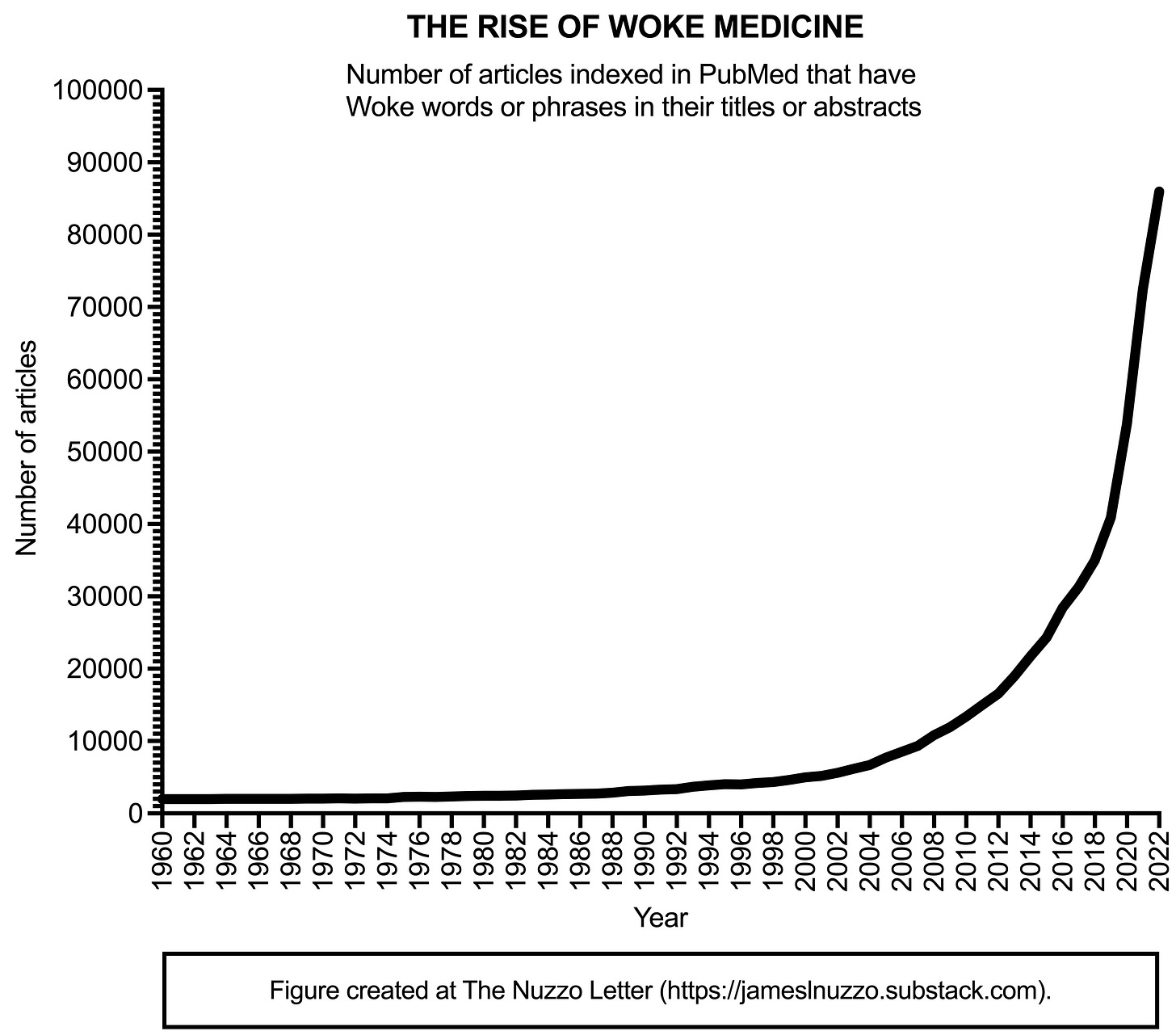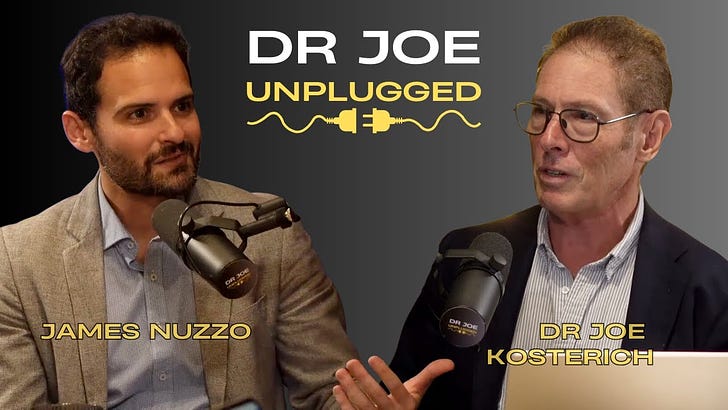In March of this year, I shared a story about one of my research papers that was found to be so disagreeable to a women on the journal’s editorial team, that she decided to resign from her position in protest to the editor’s decision to accept my paper for publication. The paper was finally published online earlier this month, and what follows is a description of the content that one woman found so provocative. Consider this your official “trigger warning.”
“Woke” is a colloquial term used to describe a raised consciousness or awareness of suggested social injustices that are thought to be caused by unfair power dynamics in society. To “dismantle” these proposed power dynamics, teachers of “critical theory,” or Woke philosophy, encourage students to engage in political activism aimed at achieving “social justice.” Diversity, equity, and inclusion (DEI) committees at universities and at other institutions are the cells that imbed and then metastasize Woke ideas into society.
Critical theory and Woke ideas originated in university humanities departments. But acute observers have probably noticed the emergence of these ideas in the sciences, including medical science and health science. Deborah Cohan, a medical doctor in San Francisco, declared “I am a racist,” in an article she wrote for the New England Journal of Medicine in 2019. After telling the world how racist she was, Cohan proceeded to tell other white doctors how racists they were, too. Cohan’s two-page commentary was a treasure trove of Woke nomenclature, which she used in repeated displays of virtual signalling and self-flagellation. Cohan littered the pages of one of the medical profession’s most historically important journals, not with words such “organ,” “brain,” “tumor,” and “infection”, but with words like “privilege,” “white supremacy,” “implicit bias,” “implicit racism,” “racial inequities,” “dismantle,” “revolution,” and, of course, “social justice.”
Readers of the Rubbish Bin at The Nuzzo Letter will know that Cohan’s article is not a stand-alone in terms of Woke papers published in biomedical and public health journals. Readers may recall the qualitative study out of the University of Saskatchewan in 2022, in which the study’s thesis was all about “confronting the problem of whiteness” in nursing education. Readers may also recall the editorial in Lancet Public Health titled, “Addressing weight stigma,” in which the anonymous author lamented about the pervasive and “stereotypical perception that people with overweight and obesity are somehow responsible for their weight.” The author professed that the “obesogenic environment” is largely responsible for obesity and that individual responsibility and personal health choices are dogmas of the past.
Nevertheless, sceptics might wonder if Woke critics are overexaggerating the impact of Woke on biomedical research and overemphasizing the musings of only a small number of unhinged medical practitioners and health researchers.
New Research on The Rise of Woke Medicine
My recent study, published in the Psychreg Journal of Psychology, sought to bring clarity to such questions. I quantified the extent to which Woke ideas are prevalent in biomedical and public health research. To do this, I searched for Woke (or Woke-related) words and phrases in the titles and abstracts of papers indexed in PubMed. PubMed is a digital database that archives millions of studies and commentaries in fields such as medicine, public health, nursing, psychology, exercise science, and more. Thus, if Woke is impacting health science, a search of PubMed will reveal this.
I searched for 156 Woke words and phrases. These words and phrases were selected based on my acquaintance with Woke concepts and James Lindsay’s online dictionary of Woke terminology.
Importantly, only the titles and abstract of articles were searched. The text making up the bodies of the articles were not examined. Consequently, the results inevitably underestimate the extent to which Woke concepts are referred to by health researchers. The results also do not reflect the impact of Woke on academia as a whole, because PubMed does not index all academic journals. For example, it does not index many education and sociology journals, which is where Woke ideas originated and are most prevalent.
The analysis revealed that use of Woke nomenclature has increased markedly in health and medical research over the past 15 years. Below is a graph that demonstrates the total use of all 156 Woke words and phrases from 1960 to 2022. The accelerated use of these words, which be seen in the sharp upward trend of the line on the graph, corresponds roughly with the time of Donald Trump’s presidential election win in 2016.
Some Woke words and phrases were used more frequently than others. Here, I highlight only a selection of the results.
Woke nomenclature can be broken down into various broad themes. Regarding the theme of group differences – something that Marxism and critical theory focus on heavily – the phrases "equity" and “inequity” were used in the titles or abstracts of 47,705 articles indexed in PubMed. The more specific phrases “health equity” and “health inequity” were used in 8,730 articles. “Racial equity” and “racial inequity” were used in 501 articles. “Gender equity” and “gender inequity” were used 1,841 articles, and “gender equality” and “gender inequality” were used in 3,724 articles.
Regarding the theme of justice, the phrases “social justice” and “social injustice” were used in the titles or abstracts of 3,933 articles indexed in PubMed. “Environmental justice” and “environmental injustice” were used in 1,186 articles, and “climate justice” and “climate injustice” were used in 77 articles.
Regarding the theme of race, the phrase "critical race theory" was used in the titles or abstracts of 180 articles indexed in PubMed. "Structural racism" was used in 714 articles, "institutional racism" in 251articles, "internalised racism" in 77 articles, "environmental racism" in 38 articles, “racial bias” in 786 articles, and "Black Lives Matter" in 198 articles. Regarding how supposedly evil and privileged white people are, the phrase "white supremacy" was used in the titles or abstracts of 129 articles, and "white privilege" was used in 114 articles.
Regarding the theme of feminism and how supposedly evil and privileged men are, the words “feminism” and “feminist” were used in the titles or abstracts of 5,349 articles indexed in PubMed. “Misogyny” and “misogynist” were used in 182 articles, "gender-based violence" in 1,862 articles, “rape crisis” in 117 articles, “male gaze” in 18 articles, "male privilege" in 30 articles, "MANELS" in 21 articles, and “benevolent sexism” in 181 articles. “Toxic masculinity” was used in 12 articles, "hegemonic masculinity" in 280 articles, and the controversial pluralization of masculinity, “masculinities,” was used in 630 articles. And then there is old canard, “patriarchy," which was used in 494 articles.
Regarding the theme of sexual orientation, the word “transgender” was used in the titles or abstracts of 10,192 articles indexed in PubMed. “Gender affirming” was used in 1,270 articles, “LGBTQ” in 1,704 articles, “non-binary” in 584 articles, “heteronormative” in 496 articles, “homophobia” in 1,864 articles, "transphobia" in 323 articles, "queering" in 101 articles, "queer theory" in 175 articles, and "birthing person" and “birthing people” in 49 articles.
Regarding the theme of violence, the word "microaggression" was used in the titles or abstracts of 555 articles indexed in PubMed. “Microassault” was used in 11 articles, “microinsult” in 18 articles, “microinvalidation” in 17 articles, "safe space" in 706 articles, and "trigger warning" in 23 articles.
Regarding the theme of individual people who have influenced Woke causes, the name "Foucault" appeared in the titles or abstracts of 1,347 articles indexed in PubMed, "Paulo Freire" in 166 articles, "Derrida" in 101 articles, and "George Floyd" in 91 articles.
And for a final mishmash of the intersectional word salad as it presents itself in the titles or abstracts of articles indexed in PubMed, “hate speech” appeared in 85 articles, "fat shaming" in 22 articles, "fat acceptance" in 20 articles, “weight bias” in 593 articles, “weight stigma” in 594 articles, “menstrual inequity” in 7 articles, "period poverty" in 24 articles, "decolonise" in 581 articles, "indigenous knowledge" in 779 articles, “intersectionality” in 3,082, "critical theory" in 369 articles, "neoliberal" in 1,818 articles, “Islamophobia” in 69 articles, and "cultural competence" in 4,902 articles. And there is much more. Please see the full text of the paper for the results for all 156 Woke words and phrases.
How Woke Harms Health
The study’s results document the rise of Woke medicine. Because the study involved use of a quantitative method, the study provides the numbers behind what many people have been sensing regarding the proliferation of Woke ideas in the medical and health sciences. Importantly, the proliferation of Woke nomenclature in health research is not merely an issue of semantics. It is about the concepts that are communicated via the nomenclature and the practical consequences that these ideas have on the lives of flesh-and-blood human beings.
Some Woke ideas might provide certain individuals with temporary comfort, but they will inevitably do more harm than good because of their lack of congruence with reality.
Woke ideas often misattribute the causes of health and life outcomes. When a doctor tells an obese adult patient that their body weight is due to the “obesogenic environment” rather than telling the patient that social and environmental factors can make certain choices more tempting, but that ultimately, they can choose what they put in their body, and they can often plan ahead, and they can master or take control of their environments by taking steps to change their challenging environments, this is an example of how Woke misinforms people about the causes of their health problems.
Woke creates a perpetual state of victimhood because it breaks the link between agency and health. Instead of empowering individuals to be agents of change through healthy life choices, Woke disempowers people, telling them that they are perpetual victims who cannot escape the supposed determinism associated with their intersectional identity.
Because Woke misattributes health causes, it then leads to misguided solutions. Woke then emphasises “structural determinants” and “social determinants” of health - phrases that appear in thousands of articles indexed in PubMed. This focus on structural or social determinants is convenient for Woke researchers and health officials because it reinforces their need to be employed as the health engineers of society. This then leads to research funds that are misallocated, public health services or initiatives that are misguided, and policies that constitute reverse discrimination.
A final way in which Woke medicine hurts patients and society in the long run is that it distracts. It uses up thousands of pages in academic journals that could be allocated to more helpful information. Deborah Cohan, for example, could have presented a case study or educational method in the field of medicine. Instead, she, with the assistance of her editorial comrades at the New England Journal of Medicine, thought patients would have better health outcomes if Cohan declared herself and other white doctors as racists. I suspect most patients would have preferred that the journal pages allocated to Cohan’s article be dedicated to a nonpolitical piece on cancer, arthritis, multiple sclerosis, or some other health condition, rather than serving as a bedpan for Cohan’s self-inflicted, Woke bloodletting.
Related Content at The Nuzzo Letter
SUPPORT THE NUZZO LETTER
If you appreciated this content, please consider supporting The Nuzzo Letter with a one-time or recurring donation. Your support is greatly appreciated. It helps me to continue to work on independent research projects and fight for my evidence-based discourse. To donate, click the DonorBox logo. In two simple steps, you can donate using ApplePay, PayPal, or another service. Thank you.



















Share this post